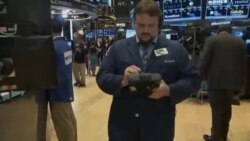ຮຸ້ນໃນເຂດເອເຊຍ ມີລາຄາສູງຂຶ້ນ ໃນວັນພະຫັດມື້ນີ້ ຫລັງຈາກ
ຮຸ້ນທີ່ຕະຫຼາດຮຸ້ນ Wall Street ຂອງສະຫະລັດ ຖີບໂຕຂຶ້ນ ຫຼັງ ຈາກມີຮ່ອງຮອຍສະແດງໃຫ້ເຫັນວ່າທະນາຄານກາງຂອງສະຫະ ລັດກຳລັງປ່ຽນທ່າທີກ່ຽວກັບການທີ່ຈະຂຶ້ນອັດຕາດອກເບ້ຍ.
ຮຸ້ນຂອງສະຫະລັດ ໄດ້ຢຸດເຊົາການຕົກລາຄາເປັນເວລານຶ່ງອາ
ທິດໃນວັນພຸດວານນີ້ ໂດຍທີ່ດັດຊະນີທີ່ສຳຄັນໆມີລາຄາສູງຂຶ້ນ
ປະມານ 4 ເປີເຊັນ.
ດັດຊະນີ Down Jones Industrials ຊຶ່ງໄດ້ຕົກລາຄາຫຼາຍໆ
ສິບເປີເຊັນ ໃນລະຫວ່າງການຊື້ຂາຍຫ້າມື້ ຜ່ານມານັ້ນ ໃນວັນ
ພຸດວານນີ້ໄດ້ຖີບໂຕສູງຂຶ້ນ 619 ໂດລາຊຶ່ງເປັນການຂຶ້ນລາຄາສູງເປັນອັນດັບສາມໃນປະ ຫວັດສາດ.
ຮຸ້ນຕ່າງໆຢູ່ໃນທົ່ວໂລກໄດ້ຕົກລາຄາເປັນການໃຫຍ່ໃນຮອບສອງອາທິດທີ່ຜ່ານມາ ຍ້ອນ ມີຄວາມວິຕົກກັງວົນກ່ຽວກັບການຊັກຊ້າລົງຂອງເສດຖະກິດຈີນ.
ທະນາຄານກາງຂອງຈີນໄດ້ຂຶ້ນດອກເບ້ຍໃນອາທິດນີ້ແລະໄດ້ໝູນເງິນເຂົ້າໃສ່ເສດຖະກິດ ເພີ້ມຕື່ມ ແຕ່ຍັງບໍ່ທັນ ເປັນທີ່ຈະແຈ້ງເທື່ອວ່າ ການເຄື່ອນໄຫວນີ້ ຈະຊ່ອຍໄດ້ໜ້ອຍຫລາຍ ປານໃດ ເພື່ອສ້າງຄວາມທຸ່ນທ່ຽງໃຫ້ແກ່ຕະຫລາດຮຸ້ນຈີນ.
ໃນວັນພະຫັດມື້ນີ້ ເປັນມື້ທີ່ວຸ້ນວາຍອີກຄັ້ງນຶ່ງ ໃນຕະຫລາດຮຸ້ນຈີນ ຄືໃນຊົ່ວໂມງສຸດທ້າຍ ຂອງການຄ້າຂາຍນັ້ນ ດັດຊະນີຮຸ້ນ ນະຄອນຊຽງໄຮ້ ໄດ້ຖີບໂຕສູງຂຶ້ນ 5.3 ເປີເຊັນ ຈາກ ການຕົກລາຄາ. ນັ້ນແມ່ນການຂຶ້ນລາຄາສູງທີ່ສຸດ ໃນເວລານຶ່ງມື້ຂອງດັດຊະນີດັ່ງກ່າວໃນ
ຮອບ 8 ອາທິດ.
ຮຸ້ນທີ່ນະຄອນໂຕກຽວ ຊິດນີ ແລະໂຊລຕ່າງກໍມີລາຄາສູງຂຶ້ນປະມານ 1 ເປີເຊັນ ໃນຕອນ ອັດຕະຫລາດ ຂະນະທີ່ຮຸ້ນໃນຢູໂຣບ ກໍມີລາຄາສູງຂຶ້ນຄືກັນ ໃນຕອນຕະຫລາດເປີດ.
ພວກຊື້ຂາຍທີ່ຕະຫຼາດຄ້າຮຸ້ນ ຢູ່ນະຄອນນິວຢອກ ກ່າວວ່າ ມັນບໍ່ແມ່ນແຕ່ການຊັກຊ້າລົງ ຂອງເສດຖະກິດຈີນ ເທົ່າໆກັນກັບການຂາດຄວາມໂປ່ງໃສຂອງຈີນທີ່ເຮັດໃຫ້ພວກນັກລົງ ທຶນມີຄວາມກັງວົນ. ພໍ່ຄ້າຊື້ຂາຍຮຸ້ນ Stephen Guilfoyle ກ່າວຕໍ່ວີໂອເອວ່າຈິດຕະວິທະ ຍາຂອງພວກນັກລົງທຶນ ແມ່ນກ່ຽວກັບ ຄວາມລະມັດລະວັງ ຫລາຍກວ່າ ຄວາມຕື່ນຕົກໃຈ. ແລະທ່ານ Alan Valdes ຈາກບໍລິສັດຫຼັກຊັບ DME ໄດ້ຖິ້ມໂທດໃສ່ຄວາມວຸ້ນວາຍຂອງ ຕະຫຼາດ ແລະການຊື້ຂາຍໃນລະດັບຕ່ຳສຳລັບເດືອນຕ່າງໆໃນລະດູຮ້ອນພ້ອມກັບຄວາມ ບໍ່ແນ່ນອນ ແລະການສູນເສຍຄວາມເຊື່ອໝັ້ນໃນນະໂຍບາຍການເງິນຂອງປັກກິ່ງ.
Asian stocks rose Thursday, following a surge on Wall Street that came after hints the U.S. Federal Reserve is backing off an interest rate hike.
U.S. stocks snapped a week-long losing string Wednesday with key indexes up about 4 percent.
The Dow Jones Industrials, which had suffered double digit declines over the last five sessions, soared 619 points Wednesday, the third-highest point gain in its history.
Global stocks have been in a freefall for the past two weeks on worries about China's slowing economy.
China's central bank raised interest rates this week to pump more money into the economy, but is unclear to what extent the move will help stabilize Chinese stocks.
Thursday saw another volatile day of trading in China. In the last hour of trading, the benchmark Shanghai Composite Index swung from a loss to close 5.3 percent higher. That was the index's biggest one-day gain in eight weeks.
Tokyo, Sydney and Seoul also closed the day up about 1 percent, while European also rose at opening Thursday.
Traders at the New York Stock Exchange say it's not China's slowing economy as much as it is China's lack of transparency that's making investors nervous. Trader Stephen Guilfoyle tells VOA that investor psychology has been more about caution than panic.And Alan Valdes at DME Securities blames the market volatility on lower volumes typical of the summer months, coupled with uncertainty and eroding confidence about Beijing's monetary policies.
Another concern is the value of China's currency. Beijing unexpectedly allowed the yuan to weaken earlier this month, raising concerns Beijing was worried about its exporters, which have helped drive its massive economic growth.
On Thursday, China's central bank set its central rate for the yuan at a four-year low, at 6.4085 against the U.S. dollar, or about .07 percent weaker than the previous day.
Most analysts predict the volatility will continue until at least September. That's when many economists believe the U.S. Federal Reserve will start raising interest rates, which have remained near zero since 2009. Lower interest rates help stimulate the economy.
Despite improving U.S. employment and housing data, a voting member of the U.S. central bank raised doubts Wednesday on the timing for a rate hike. William Dudley, president of the Federal Reserve Bank of New York, told reporters that recent turmoil in global markets makes the idea of raising rates next month less compelling.











